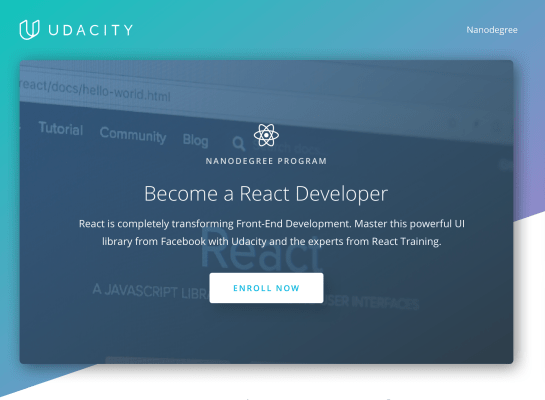In its quest to reduce persistent skills gaps, Udacity has been designing condensed courses to get students up to speed on trendy topics to improve employment outcomes. The startup’s “Nanodegrees,” as they call them, span VR, robotics, deep learning and other key technical and non-technical skills. Today Udacity is announcing its latest addition to the lineup — React.
React, a JavaScript library for front-end development, has become insanely popular in recent months. It’s frequently used by companies like Airbnb, Netflix and Facebook and is a great contemporary skill to have if you’re looking to get hired in tech.
As with its other Nanodegree programs, Udacity’s approach to teaching React involves external partners. The course was designed alongside React Training, a group dedicated to teaching the ins and outs of the library both online and in-person to corporations.

Interest in React has grown immensely in recent years — graph shown search trends via Google
The four month, single-term, course has been divided up into three segments, each with its own project that students can highlight on their Github accounts to prospective employers.
Following the framework of traditional React Training courses, students will be exposed to React fundamentals early on before learning Redux and React Native — tools offering additional control and new use cases.
At $499, the Nanodegree is quite a bit less expensive than traditional higher education. For the price students receive mentorship, access to forums and a dedicated Slack channel. The idea is to ensure that at any point students have access to experts and peers to power through challenging material when they’re feeling discouraged.
“Udacity has the resources to do code reviews and offer mentors, we’re just the three of us,” Tyler McGinnis, partner at React Training, told me in an interview when asked about why he felt the partnership with Udacity was beneficial to students.
That said, online education more broadly is still often out of reach of those who could most benefit from it. Services like Udacity are largely beneficial to society so long as their leaders recognize that it takes more than an online presence to move the needle.
To this avail, Udacity’s CEO Vish Makhijani has been talking to state and local politicians to build out a physical presence — Udacity has been running a program in Reno, Nevada to reach new students in person.
